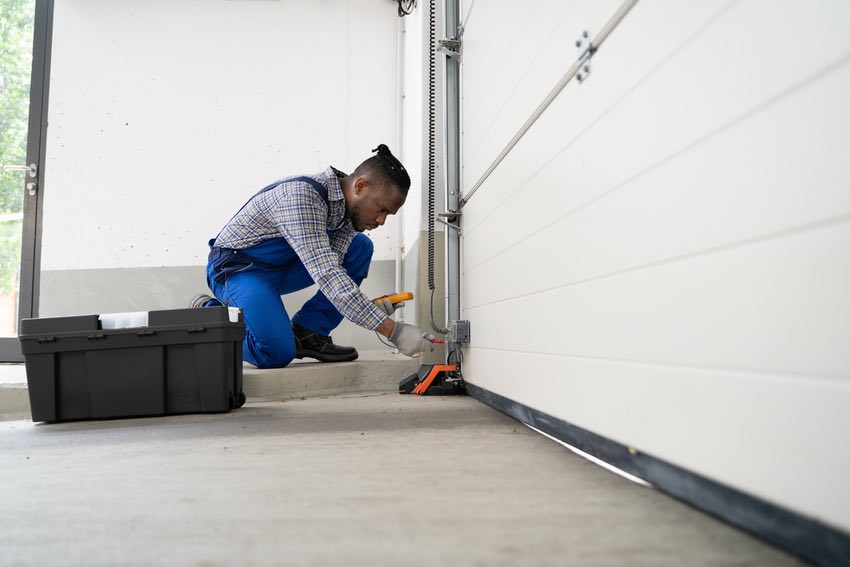Garage doors have a high return on investment, making them one of the cost-effective ways to enhance your home’s curb appeal and add value to your property. Here’s what you need to know about the cost of replacing and installing a garage door, including information about different door types and how to tell when it’s time to get a new one.
Average Cost to Install a Garage Door
The average cost to install a garage door is about $2,700 to $6,000, but there are several factors that affect the actual cost of a garage door.
Factors that Affect the Cost of a Garage Door
The cost of a garage door can vary significantly depending on the style, size, and materials. Before you choose a garage door, look at the factors that impact the cost of a garage door installation.
Repair or replace
The average cost of replacing a garage door is about $1,200, with costs ranging from $750 to $1,638. Repairs cost considerably less, usually about $100 to $600. A first-time garage door installation costs much more than a replacement, but the cost varies considerably depending on the size and type of door.
Garage door openers don’t last as long as garage doors. They have an average lifespan of 10 years and cost between $50 to $300 to repair. If you want a recommendation, we really like our Genie garage door opener.
Size of your garage
The size of your garage will determine how many car bays it has, which is one of the biggest determiners of the cost of garage door installations. Garages with one, two, or three-car designs can use single or multiple doors.
| Size of garage | Number and size of doors | Garage door installation cost |
|---|---|---|
| 1-car | 1 single door | $500 to $2,500 |
| 2-car | 1 double door | $750 to $4,000 |
| 2-car | 2 single doors | $1,100 to $4,700 |
| 3-car | 1 single door and 1 double door | $1,300 to $6,400 |
| 3-car | 3 single doors | $1,600 to $7,000 |
Hardware
You may be able to use some or all of the hardware on a replacement garage door installation. Here are the costs associated with the different types of garage door hardware:
- Springs- $250 to $500
- Cables- $100 to 200
- Tracks- $200 to $400
- Sensor- $100 to $200
- Glass windows- $230 to $460
- Rollers- $130 to $260 per door
If you’re doing your own garage door repairs, you can also purchase a hardware kit. The cost of a garage door hardware kit varies depending on the door type.
Type of garage door
There are several types of garage doors. Choosing the right style will depend on your budget and the rest of your home’s exterior and design features.
| Type of garage door | Cost (not including installation) |
|---|---|
| Sectional | $750 to $2,500 |
| Roll-up | $850 to $3,000 |
| Side-hinged | $470 to $7,700 |
| Tilt-up | $470 to $7,200 |
Materials
The type of materials your garage door is made from also helps determine the cost. Here are the pros and cons of the most common types of garage door materials.
| Material | Pros | Cons |
|---|---|---|
| Aluminum | Resistant to rust, customizable, and low-maintenance | Less durable, low insulating value, and not fully waterproof |
| Composite (or faux wood) | Moisture and decay resistant, durable, and made from sustainable materials | Expensive and heavy |
| Fiberglass | Resistant to shrinking and warping, low-maintenance | Turns color and gets brittle with age |
| Steel | Durable, cost-effective, and low-maintenance | Susceptible to corrosion and denting |
| Wood | Attractive, highly customizable, and stainable | Heavy, high-maintenance, and can swell, warp, and rot |
Customizations
Adding custom designs, stained glass windows, decorative trim, and high-tech lock systems will increase the cost of a garage door but will also increase the curb appeal, value, and security of your property.
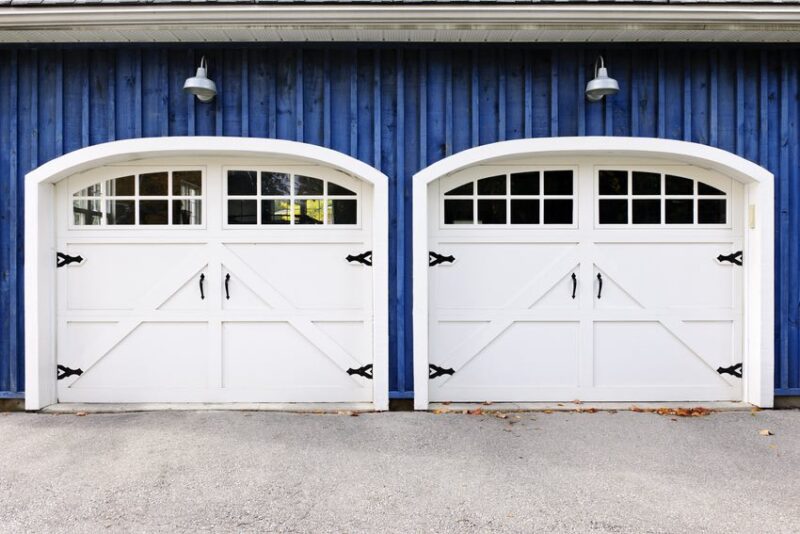
Your region and location
Regional price differences aren’t uncommon for many types of building materials. In places with increased demand and higher costs of living, you should expect to pay more for materials and labor. Also, if you live in a remote location, you may have to pay extra delivery fees.
Average Cost of Different Types of Garage Doors
Some materials are better suited for different environments, so cost alone shouldn’t influence your purchasing decision. Here is the average cost of different types of garage doors, with recommendations for usage in different environments and climates.
| Material | Cost | Recommended uses |
|---|---|---|
| Aluminum | $700 to $2,000 | Great for all climates, but extreme heat will make it easy to dent |
| Composite (or faux wood) | $950 to $4,100 | Excellent choice for any climate |
| Fiberglass | $1,000 to $2,100 | Best for climates with high heat and humidity |
| Steel | $600 to $2,000 | Economical choice for any climate but not suitable for coastal homes |
| Wood | $700 to $1,800 | Performs well in mild, dry climates |
Types of Garage Doors
Your purchasing decision may be determined by matching a garage door to existing hardware, but if you’re installing a garage door for the first time, you have several options. Choose from sectional, roll-up, side-hinged, and tilt-up garage doors.
Sectional Garage Doors
Average price- $750 to $2,500
Sectional garage doors are the most popular. They are made of several horizontal panels hinged together and mounted on tracks, and they are easily paired with an automatic door opener. Sectional garage doors are available in various materials, including steel, wood, aluminum, and fiberglass.
Roll-up Garage Doors
Average price- $850 to $3,000
Also called rolling garage doors, roll-up doors are slightly more expensive than sectional garage doors, but they require less headroom and maintenance. They are made of horizontal sheets of wood, aluminum, steel, or glass, and the price varies depending on the material used.
Side-hinged Garage Doors
Average price- $470 to $7,700
Side-hinged garage doors, which are hinged at the sides and swing outward when opened, are making a comeback. They are aesthetically pleasing and can be made from numerous types of materials, including wood, steel, and aluminum. They are usually purchased as a set of two doors, which makes them smaller and easier to install than other types of garage doors.
Tilt-up Garage Doors
Average price- $470 to $7,200
Tilt-up garage doors, sometimes called canopy garage doors, are made from solid panels. When opening and closing tilt-up garage doors, the entire door is tilted up and then swings outwards towards the driveway. When open, it rests horizontally against the header of the garage door opening.
Pros and Cons of Different Types of Garage Doors
Every style of garage door has advantages and disadvantages. Learn more about the pros and cons of each type.
| Type of garage door | Pros | Cons |
|---|---|---|
| Sectional | Easy to install, available in a variety of materials, and works well with electric openers | Expensive and difficult for some people to install |
| Roll-up | Easy to install, works with automatic openers, durable secure, and low-maintenance | Limited design customizations, not insulated, and not as attractive as other types of garage doors |
| Side-hinged | Saves head space and works well for large vehicles | Usually requires manual operation and is less secure than other types |
| Tilt-up (canopy) | Inexpensive and low-maintenance | Noisier than other types of doors, usually requires manual operation, and doors can’t be opened when a vehicle is parked in front of them |
Labor Involved in Garage Door Installation
The labor cost to install a garage door is affected by several factors, including local demand for skilled laborers and electricians. On average, the labor costs to install a garage door are about $500, but if you need wiring for an automatic door, you could also need an electrician, which costs between $50 and $100 per hour.
Steps Involved in Garage Door Installation
If you decide to install a garage door yourself, here are some tips. Before you select a garage door, measure the size of the opening. Standard single garage doors are 7’ x 8’ or 7’ x 9’ and double doors are 7’ x 16’. If you’re replacing a garage door, you may be able to save money by using the same tracks and hardware.
Once you have your new garage door ready for installation, follow these steps to install it:
Step 1- Prepare the opening for installation
If you need to remove an old door, find someone to help you. Garage doors are heavy, weighing 250 to 450 pounds. You may also need to hire a professional to release the garage door tensioner, as they can cause injury when improperly handled.
Step 2- Install the tracks
Install the tracks for the garage door according to the manufacturer’s instructions, ensuring they are level and secure.
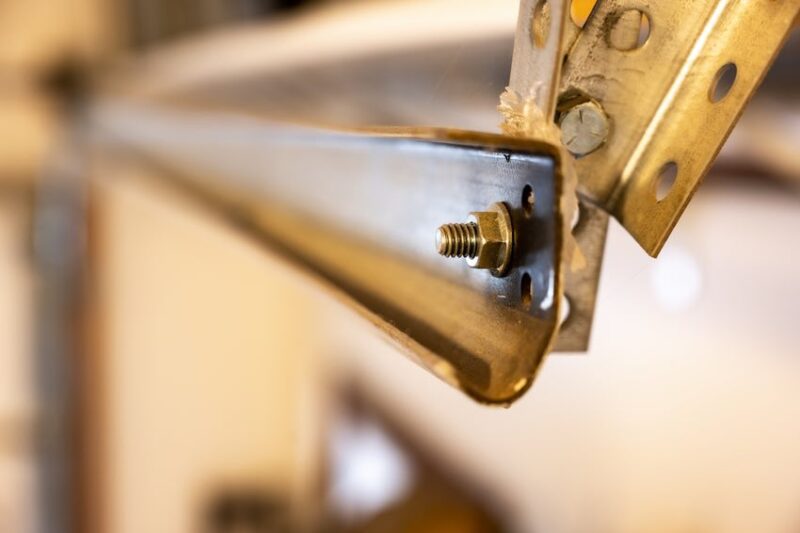
Step 3- Connect the springs and hardware
Hang the door and connect the springs and hardware. Ensure that everything is properly connected and secure.
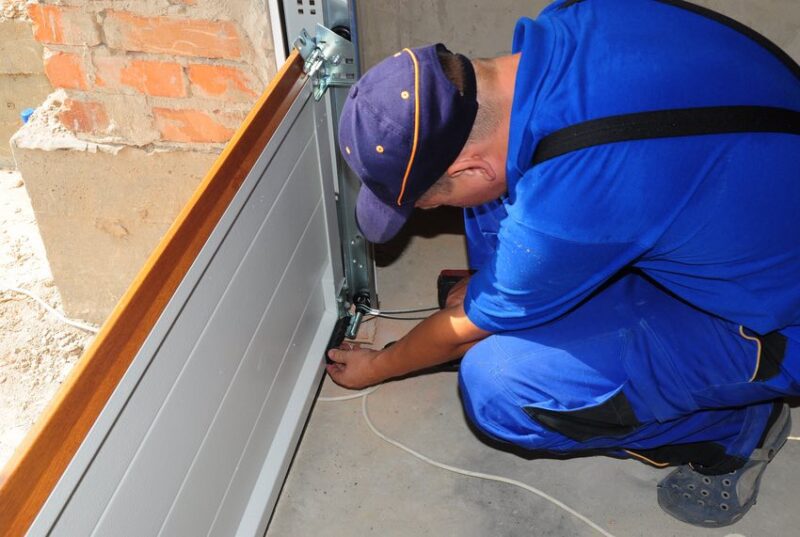
Step 4- Test the door
Test the operation of the door to make sure that it opens and closes properly, and make any necessary adjustments.
Step 5- Check the safety features
Because garage doors are heavy, there have several safety features. If you’re unsure whether they are operating properly, hire a garage door professional to check them.
Tools Required for Garage Door Installation
The tools required for garage door installations will depend on the type of door you’re installing. Your garage door should come with instructions and tool recommendations, but these are the most common tools you’ll need:
- Tape measure
- Utility knife
- Step ladder
- Level
- Safety glasses
- Hammer
- Pliers
- Socket set
- Cordless drill
- Drill bit set
- Socket bit
- Phillips driver bit
- Open-ended wrench set or adjustable wrench
Time Required for Garage Door Installation
You can save a lot of money by DIYing a garage door installation. Garage door installations take about 8 to 12 hours, but if you’re unfamiliar with the process, it could take longer. You’ll need assistance disconnecting the tension springs and removing the old door, but the rest can be handled by one person.
Please ensure you understand the required safety measures involved with garage door removal and installation. Those safety springs, for example, hold a lot of tension.
When to Replace a Garage Door
If your garage door is breaking down often and needs frequent repairs, it could be time for a new door. You can lower your garage door replacement cost by purchasing a new door that works with your existing tracks and hardware.
Signs Your Garage Door Needs Replacement
Improper functioning isn’t the only sign that it’s time for a new garage door. Here are some of the signs that your garage door needs to be replaced:
- Visible damage, including dings and dents
- Rotting wood
- Sagging
- Shaking during opening
- Noisy (be sure to try oiling the guide wheels and hinges first!)
- Broken parts and wires
- Difficult to open and close (check the springs!)
- Doesn’t respond to the garage door opener
Keep in mind that we don’t suggest running out and getting a new garage door at the first sign of wear. After all, if those noises are simply hinges in need or some lubrication or guide rollers that need replacing—those are far less expensive than the cost associated with installing a new garage door.
Unless you simply hate your current garage door, it almost always makes sense to get a repair estimate before going to the cost of installing a full replacement. Garage doors are made to last a long time.
Reasons to Replace a Garage Door
Since your garage is one of the first things visitors see, a new door is a great way to make a good first impression. Here are the top seven reasons to replace a garage door:
1. Property value
The return on investment (ROI) of a new garage door is between 95% to 103%, so it’s an excellent way to add value to your home. If you plan to sell your home, a new garage door will make your home more attractive to buyers.
2. Curb appeal
Curb appeal is important for homeowners that take pride in their homes, whether they are planning on selling or not. New garage doors enhance the aesthetics of your home.
3. Energy efficiency
A new garage door has a better insulating value than an old one, and the savings on heating and cooling alone can make it pay for itself.
4. Security
Improperly functioning garage doors are one of the easiest ways for people to break into your home. Since garages are often full of valuable belongings, it makes sense to make them more secure with a new garage door.
5. Accessibility
When it’s easy to get in and out, you’re more likely to use your garage. Also, if it’s well-insulated, it will be a pleasure to use the space for all those projects you’ve been wanting to work on, no matter what the weather is like outside.
6. Safety
Garage doors weigh 250 to 450 pounds, and the impact of a falling garage door can cause serious injury. Also, fingers and hands can get pinched opening and closing doors that aren’t working properly.
7. Insurance
Since a new garage door makes your home safer and more secure, you should talk to your insurance agent about possible premium reductions.
Average Lifespan of a Garage Door
Nothing lasts forever, including garage doors. The average lifespan of a garage door is about 15 to 30 years. Different types of garage doors last longer, and with proper maintenance you can increase the life expectancy of your garage door, but you can’t protect it from regular usage and environmental damage forever.
FAQs About Garage Door Installation Costs
How Long Does It Take to Install a Garage Door?
It depends on the size and type of garage door you are installing and how much DIY experience you have, but it usually takes about 8 to 12 hours to install a garage door.
Can I Install a Garage Door Myself?
You can install a garage door yourself with the right DIY skills. Carefully follow the manufacturer’s instructions and when you’re done, check that safety features are working. You can always call a professional to make sure you got it right.
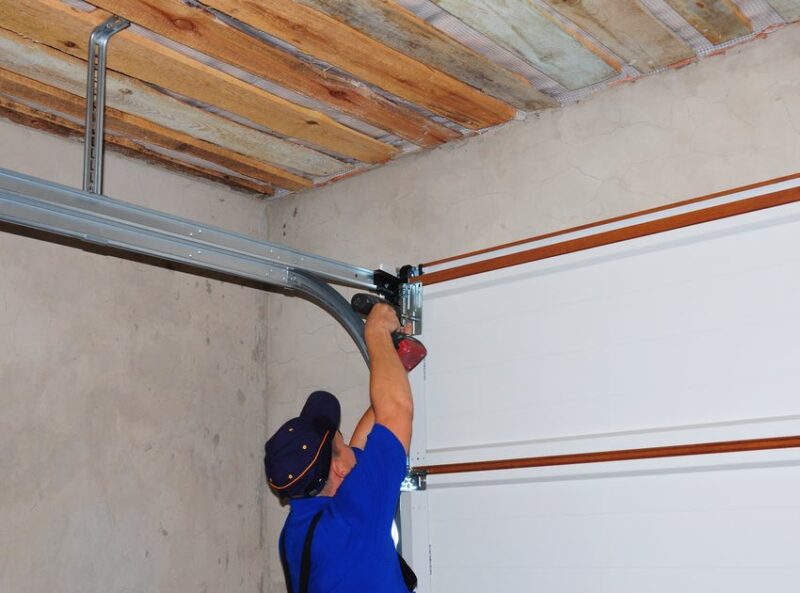
How Do I Choose the Right Size Garage Door?
Standard garage door sizes are 7’ x 8’ or 7’ x 9’ for single doors and 7’ x 16’ for double doors. To choose the right size of garage door, measure the length and width of your garage door opening.
How Much Does it Cost to Install a Garage Door Opener?
The cost to install a garage door opener depends on the type of garage door you have. Sectional and roll-up garage doors work well with automatic openers and it costs about $220 to $550 to install an opener. Garage door openers have an average lifespan of 10 years and cost between $50 to $300 to repair.
How Do I Maintain My Garage Door?
Garage doors usually last 15 to 30 years with proper maintenance. You should lubricate the moving parts every six months. At the same time, inspect the hardware and rollers. Tighten cables and hardware as needed, and replace rollers about every seven years.

